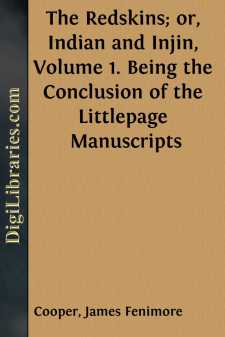Categories
- Antiques & Collectibles 13
- Architecture 36
- Art 48
- Bibles 22
- Biography & Autobiography 813
- Body, Mind & Spirit 142
- Business & Economics 28
- Children's Books 14
- Children's Fiction 11
- Computers 4
- Cooking 94
- Crafts & Hobbies 4
- Drama 346
- Education 46
- Family & Relationships 57
- Fiction 11828
- Games 19
- Gardening 17
- Health & Fitness 34
- History 1377
- House & Home 1
- Humor 147
- Juvenile Fiction 1873
- Juvenile Nonfiction 202
- Language Arts & Disciplines 88
- Law 16
- Literary Collections 686
- Literary Criticism 179
- Mathematics 13
- Medical 41
- Music 40
- Nature 179
- Non-Classifiable 1768
- Performing Arts 7
- Periodicals 1453
- Philosophy 64
- Photography 2
- Poetry 896
- Political Science 203
- Psychology 42
- Reference 154
- Religion 513
- Science 126
- Self-Help 84
- Social Science 81
- Sports & Recreation 34
- Study Aids 3
- Technology & Engineering 59
- Transportation 23
- Travel 463
- True Crime 29
The Redskins; or, Indian and Injin, Volume 1. Being the Conclusion of the Littlepage Manuscripts
Categories:
Description:
Excerpt
PREFACE.
This book closes the series of the Littlepage Manuscripts, which have been given to the world, as containing a fair account of the comparative sacrifices of time, money and labour, made respectively by the landlord and the tenants, on a New York estate; together with the manner in which usages and opinions are changing among us; as well as certain of the reasons of these changes. The discriminating reader will probably be able to trace in these narratives the progress of those innovations on the great laws of morals which are becoming so very manifest in connection with this interest, setting at naught the plainest principles that God has transmitted to man for the government of his conduct, and all under the extraordinary pretence of favouring liberty! In this downward course, our picture embraces some of the proofs of that looseness of views on the subject of certain species of property which is, in a degree perhaps, inseparable from the semi-barbarous condition of a new settlement; the gradation of the squatter, from him who merely makes his pitch to crop a few fields in passing, to him who carries on the business by wholesale; and last, though not least in this catalogue of marauders, the anti-renter.
It would be idle to deny that the great principle which lies at the bottom of anti-rentism, if principle it can be called, is the assumption of a claim that the interests and wishes of numbers are to be respected, though done at a sacrifice of the clearest rights of the few. That this is not liberty, but tyranny in its worst form, every right-thinking and right-feeling man must be fully aware. Every one who knows much of the history of the past, and of the influence of classes, must understand, that whenever the educated, the affluent and the practised, choose to unite their means of combination and money to control the political destiny of a country, they become irresistible; making the most subservient tools of those very masses who vainly imagine they are the true guardians of their own liberties. The well-known election of 1840 is a memorable instance of the power of such a combination; though that was a combination formed mostly for the mere purposes of faction, sustained perhaps by the desperate designs of the insolvents of the country. Such a combination was necessarily wanting in union among the affluent; it had not the high support of principles to give it sanctity, and it affords little more than the proof of the power of money and leisure, when applied in a very doubtful cause, in wielding the masses of a great nation, to be the instruments of their own subjection. No well-intentioned American legislator, consequently, ought ever to lose sight of the fact, that each invasion of the right which he sanctions is a blow struck against liberty itself, which, in a country like this, has no auxiliary so certain or so powerful as justice.
The State of New York contains about 43,000 square miles of land; or something like 27,000,000 of acres. In 1783, its population must have been about 200,000 souls. With such a proportion between people and surface it is unnecessary to prove that the husbandman was not quite as dependent on the landholder, as the landholder was dependent on the husbandman. This would have been true, had the State been an island; but we all know it was surrounded by many other communities similarly situated, and that nothing else was so abundant as land. All notions of exactions and monopolies, therefore, must be untrue, as applied to those two interests at that day.
In 1786-7, the State of New York, then in possession of all powers on the subject, abolished entails, and otherwise brought its law of real estate in harmony with the institutions. At that time, hundreds, perhaps thousands, of the leases which have since become so obnoxious, were in existence. With the attention of the State drawn directly to the main subject, no one saw anything incompatible with the institutions in them. It was felt that the landlords had bought the tenants to occupy their lands by the liberality of their concessions, and that the latter were the obliged parties. Had the landlords of that day endeavoured to lease for one year, or for ten years, no tenants could have been found for wild lands; but it became a different thing, when the owner of the soil agreed to part with it for ever, in consideration of a very low rent, granting six or eight years free from any charge whatever, and consenting to receive the product of the soil itself in lieu of money....












